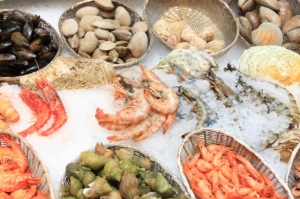If you like clams, mussels, crab or lobster, here is a good reason to indulge. Shellfish is tops when it comes to the foods that support thyroid health.
Clams and mussels, especially, are rich sources of selenium, iron and iodine, all nutrients essential for normal thyroid function and hormone production.
 Selenium is highly concentrated in the thyroid gland. It is an essential part of the enzyme that catalyzes the conversion of T4, the inactive form of thyroid hormone, to T3, the active form of thyroid hormone. By doing so, it regulates the concentration of the active hormone.
Selenium is highly concentrated in the thyroid gland. It is an essential part of the enzyme that catalyzes the conversion of T4, the inactive form of thyroid hormone, to T3, the active form of thyroid hormone. By doing so, it regulates the concentration of the active hormone.
Iron, meanwhile, is part of thyroid peroxidase, an enzyme that uses iodine ions and hydrogen peroxide to generate thyroglobulin, which plays a central role in the production of thyroid hormones.
Shellfish are also a rich source of natural iodine. Iodine is concentrated in the thyroid gland, where it is used directly to make thyroid hormones. Iodine deficiency causes the thyroid gland to swell, a condition called goiter. The gland may eventually become hyperplastic and develop nodules.
Finally, shellfish, like wild salmon, are a good source of omega-3 fatty acids. Research in mice suggests that omega-3 fatty acids improve thyroid hormone receptor sensitivity in liver cells, which may aid in proper lipid metabolism and help your to clear out bad cholesterol.
Shellfish are actually less likely to be contaminated by mercury or PCBs than large fatty game fish like swordfish or tuna, according to David O. Carpenter, M.D., Professor of Environmental Health Sciences at the University of Albany, in Rensselaer, N.Y. But some shellfish are prone to carrying natural toxins found during algae blooms, and occasionally, viral infections. These problems are more likely to occur during warm weather and warm water. (Hence the rule to buy clams and oysters only during months that contain an “R” — the cooler months in North America.) Most shellfish contamination is fairly localized and monitored by state health departments, which will issue advisories if they detect a problem.
The best way to get toxin-free shellfish is to buy it in season from a reputable fish market or large supermarket and to ask about any potential problems. For frozen shrimp or lobster, it’s best to buy U.S.-caught. (Avoid farm-raised shrimp from Vietnam, Malaysia or Indonesia.) For canned clams, check the can label and make sure they are USA-sourced.
REFERENCES
Carpenter DO. Health effects of persistent organic pollutants: the challenge for the Pacific Basin and for the world. Rev Environ Health. 2011;26(1):61-9.
Carpenter DO. Polychlorinated biphenyls (PCBs): routes of exposure and effects on human health. Rev Environ Health. 2006 Jan-Mar;21(1):1-23.
Schomburg L. Selenium, selenoproteins and the thyroid gland: interactions in health and disease. Nat Rev Endocrinol. 2011 Oct 18;8(3):160-71.
Souza LL, Nunes MO, Paula GS, et. al Effects of dietary fish oil on thyroid hormone signaling in the liver. J Nutr Biochem. 2010 Oct;21(10):935-40.
Triggiani V, Tafaro E, Giagulli VA, et al. Role of iodine, selenium and other micronutrients in thyroid function and disorders. Endocr Metab Immune Disord Drug Targets. 2009 Sep;9(3):277-94. Epub 2009 Sep 1.
Zimmermann MB, Köhrle J. The impact of iron and selenium deficiencies on iodine and thyroid metabolism: biochemistry and relevance to public health. Thyroid. 2002 Oct;12(10):867-78.
Zimmermann MB. The influence of iron status on iodine utilization and thyroid function. Annu Rev Nutr. 2006;26:367-89.

Leave A Comment